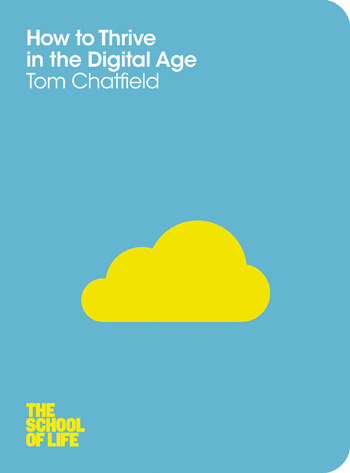I’m chuffed and delighted to say that my new book, How to Thrive in the Digital Age, is published this Thursday 10th May, together with the five other titles in the School of Life’s new series of guides for everyday living by the brilliant Roman Krznaric, Philippa Perry, John Armstrong, John Paul Flintoff and Alain de Botton.
All six of us will be speaking together in May through the UK and Ireland on the School of Life Live tour; I’ll also be appearing with some of the others at events ranging from Oxford and Bristol to the Hay Literary Festival, How The Light Gets In, and London.
Below is a short extract from the Introduction to the book. If you buy a copy, I hope you enjoy it – and do let me know what you think.
Intellectually, socially and legislatively, we are lagging years, if not decades, behind the facts of the present. Generationally, the divide between those ‘natives’ born into a digital era and those who grew up before it can seem a chasm across which common understandings and shared values are difficult to articulate.
This book examines the question of what it may mean for all of us not simply to exist but to thrive within a digital world; to ‘live deep’, in Thoreau’s phrase, and to make the most of the unfolding possibilities of our times.
Exploring these possibilities is like exploring a new city or continent. We are entering a place where human nature remains the same, but the structures shaping it are alien. Today’s digital world is not simply an idea or a set of tools, any more than a modern digital device is simply something switched on for leisure or pleasure. Rather, for an ever-increasing number of people, it is a gateway to the place where leisure and labour alike are rooted: an arena within which we seamlessly juggle friendships, media, business, shopping, research, politics, play, finance, and much else besides.
When it comes to the question of thriving, my aim is to trace two interwoven stories: first, how we as individuals can thrive in the digital world; and second, how society can help us to both realize our potential in this world, and relate to others in as fully human a way as possible.
These stories both begin in the same place, with the history of digital machines. I then go on to explore one of the most central questions of the present state of technology: what it means to be able to say ‘no’ as well as ‘yes’ to the tools in our lives, and to make the best of ourselves both by using technology and by deliberately carving out time for not using it.
I’ll also talk about those challenges that almost all of us – whether we know it or not – grapple with every day: issues of personal identity, privacy, communication, attention, and the regulation of all the above.
If there is a common thread here, it is the question of how individual experience fits into the new kind of collective life of the twenty-first century: how what ‘I’ am relates to what others know of me, what I share with those others, and what can remain personal and private.
